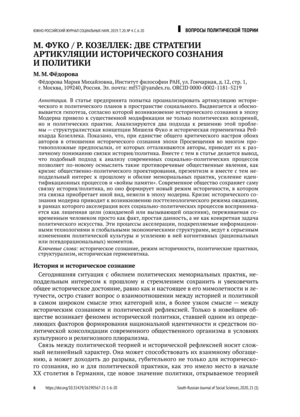Abstract
The article attempts to analyze the articulation of historical and political planes in social space. A hypothesis is put forward and substantiated, according to which the emergence of historical consciousness in the Age of Modernity led to a significant modification of not only political opinions, but also political practices. Two approaches to solving this problem are analyzed – the structuralist concept of Michel Foucault and the historical hermeneutics of Reinhard Kozelleck. It is shown that, with the unity of the common critical attitude of both authors regarding the historical consciousness of the Enlightenment, the opposing assumptions, from which the authors proceed, result in their different understanding of the history / politics connection. The conclusion is drawn that such an approach to the analysis of modern socio-political processes allows us to interpret, in a new way, such controversial social phenomena as the crisis of socio-political designing, the presentism and, at the same time, the genuine interest in the past and the abundance of memorial practices, the strengthening of identification processes and of “memory wars”. Modern society preserves the history / politics connection, but it also forms a new regime of historicity in which this connection takes on a form different than that in the Age of Modernity. The historical consciousness crisis in the Age of Modernity leads to the emergence of a post-teleological standby mode in which the acceleration of all socio-political processes is perceived as devoid of any purpose, either expected or causing concern, and treated by contemporary people as a mere fact, not as a specific problem of political art. This acceleration, reinforced by information technology and global economic structures, leads to serious changes in political culture and the strengthening of its cognitive moments, both rational and pseudo-rational.
Keywords
References
- Bantigny, L. (2015). La fin de l’histoire n’aura pas lieu. Écrire l’histoire, 15. Retrieved from http://journals.openedition.org/elh/570.
- Barash, J. A. (2004). Politiques de l’histoire. P.: Presses Universitaire de France.
- Behrent Michael, C. (2013). Penser le XXe siècle avec Michel Foucault. Revue d’histoire moderne & contemporaine, 60–4/4, 7–28. DOI: 10.3917/rhmc.604.0007
- Block, M. (1973). Apologiya istorii ili Remeslo istorika [The Historian’s Craft]. M.: Nauka.
- Dosse, F. (2013). Le moment structuraliste ou Clio en exil. Le Vingtieme siècle. Revue d’histoire, 1(117), 133–147.
- D’yakov, A. V. (2010). Mishel` Foucault i yego vremya [Michel Foucault and His Time]. SPb.: Aleteyya.
- Edwards, J. (2007). The Ideological Interpellation of Individuals as Combatants: An Encounter between Reinhart Kozelleck and Michel Foucault. Journal of Political Ideologies, 12(1), 49–66 DOI: 10.1080/13569310601095606
- Ewing, A. B. (2016). Conceptions of Reinhard Kozelleck’s Theory of Historical Time in the Thinking of Michael Oakeshott. History of Europeen Ideas, 42(3), 412–429. DOI: 10.1080/01916599.2015.1118331
- Fedorova, M. M. (2007). Ponyatiye politicheskogo v kontekste fenomenologicheskoy kritiki filosofii istorii [The Notion of the Political in the Context of Phenomenological Critique of Philosophy of History]. Polis [Polis. Political Studies], 4, 66–82.
- Foucault, M. (1990). Qu’est-ce que la critique? Critique et Aufklärung. Bulletin de la société française de philosophie, 84(2). Retrieved from http://www.scribd.com/doc/56577710/Foucault-Qu-est-Ce-Que-La-Critique
- Foucault, M. (2002). Chto takoye Prosveshcheniye [What is Enlightenment]. In Foucault M. Intellektualy i vlast’: Izbr. polit. stat’i, vystupleniya i interv’yu v 3-kh tt. T. 1 [Intellectuals and Power: Selected Political Articles, Speeches and Interviews. P. 1] (pp. 335–359). M.: Praksis
- Foucault, M. (2004). Arkheologiya znaniya [The Archaeology of Knowledge]. SPb: Gumanitarnaya Akademiya.
- Foucault, M. (2005). Nuzhno zashchishchat’ obshchestvo [It Is Necessary to Protect Society]. SPb: Nauka.
- Foucault, M. (2006). Sub’’yekt i vlast’ [Subject and Power]. In M. Foucault Intellektualy i vlast’ [Intellectuals and Power]. M.: Praksis.
- Foucault, M. (1996). Nitsshe, genealogiya, istoriya [Nietzsche, Genealogy, History]. In Filosofiya epokhi postmoderna [The Philosophy of the Postmodern Era]. M.: Krasiko-print.
- Gusdorf, G. (1971). Les Principes de la pensée au sciècle des Lumières. P.: Payot.
- Hazard, P. (1961) La crise de conscience européene (1680–1715). P.: Boivin et Cie.
- Kozelleck, R. (1979). Regne de la critique. P.: Ed. de Minuit.
- Kozelleck, R. (2004). Mozhem li my rasporyazhat’sya istoriyey? (Iz knigi “Proshedsheye budushcheye. K voprosu o semantike istoricheskogo vremeni”) [Can we Manage the Story? (From the Book “The Past Future. On the Question of the Semantics of Historical Time”)]. Otechestvennyye zapiski [Patriotic Notes], 5. Retrieved from http://www.strana-oz.ru/2004/5/mozhem-li-my-rasporyazhatsya-istoriey-iz-knigi-proshedshee-budushchee-k-voprosu-o-semantike-istoricheskogo-vremeni
- Lefort, C. (1972). Le travail de l’oeuvre. Machiavel. P., Gallimard.
- Massonet, S. (2016). Michel Foucault et l’histoire de la pensée critique. Acta fabula, 17(6). Retrieved from http://www.fabula.org/revue/document9942.php
- Meyneke, F. (2004). Vozniknoveniye istorizma [The Rise of Historicism]. M.: ROSSPEN.
- Nora, P. (2018). L’histoire était le milieu intellectual de Foucault. L’histoire. Retrieved from https://www.lhistoire.fr/%C2%AB%C2%A0lhistoire-%C3%A9tait- le-milieu-intellectuel-de-foucault%C2%A0%C2%BB
- Olsen, N. Schmitt, C. (2011). Reinhart Kosellek and the Foundations of History and Politics. History of European Ideas, 37(2). 197–208.
- Sungurov, A. Yu. (2016). Vremya i politika: vvedeniye v khronopolitiku [Time and Politics: An Introduction to Chronopolitics]. SPb: Aleteyya.
- Zhil’son, E. (2001). Dukh srednevekovoy filosofii [The Spirit of Mediaeval Philosophy]. M.: Institut filosofii, teologii i istorii sv. Fomy.
 Русский
Русский


